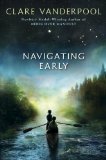Summary | Excerpt | Reading Guide | Reviews | Beyond the book | Read-Alikes | Genres & Themes | Author Bio

Critics' Opinion:
Readers' Opinion:
First Published:
Jan 2013, 320 pages
Paperback:
Dec 2014, 336 pages
 Book Reviewed by:
Book Reviewed by:
Sharry Wright
Buy This Book
The year is 1945, the end of the Second World War. Two boys set off into the woods of Maine in search of The Great Appalachian Bear, which has not been seen for many years, and is believed by most to be dead. The boys' adventure is fraught with dangers – icy rivers, murderous pirates, brambles, catacombs, poisonous snakes. The perfect set-up for an adventure story. Which it is. But Navigating Early is much more than that. It is also a quest for truth, meaning, and self.
The boys, Jack and Early, have each lost something dear to them, leaving them feeling abandoned and untethered. They need to find a way to fill the gaping holes in their hearts. While Early has a missing brother, Jack's mother has recently died, and his father, a navy officer, has distanced himself as he struggles with his own loss and pain. Jack lands at a boys' boarding school in Maine with the only offer of friendship coming from "the strangest of boys," Early Auden. At first, Jack wants nothing to do with Early. He tells us, "I didn't want his help. I didn't want his advice. What did he know, anyway? He was just an odd kid who nobody listened to." Yes, Early is strange. Adults will recognize him as a highly functioning autistic savant, but he is presented without labels, as a child and old soul, brilliant, charming, and sometimes maddening in his odd approach.
Jack, the protagonist, is portrayed with emotional depth and clarity. Clare Vanderpool paints a portrait of an adolescent boy lost in the terrain of loneliness, so convincingly that my heart ached for him. In this Hero's Journey, Jack, lost and untethered, reluctantly follows Early on his quest to find the Great Appalachian Bear. Yes, it begins as Early's quest, but it becomes Jack's as well as each boy searches for answers, for meaning, for the courage to continue. Early becomes Jack's guide. The quest and the obstacles that the boys must overcome, represent something different to each of them. Along the way, there are life lessons in not giving up, from a hundred year-old woman, and in tracking, wilderness survival and fly-fishing from a mountain man.
Along with the quest, there is a second story; Early, a mathematical genius, is obsessed with the story of a boy named Polaris, called Pi, which he unexplainably 'reads' to Jack in the never-ending sequence of the number pi. He begins the story like this: "Before the stars had names, before men knew how to use them to plot their courses, before anyone had ventured beyond his own horizon, there was a boy who wondered what lay beyond." The boy, Pi, grows up and goes out in the world, but before he leaves, he asks his mother how he will find his way. She tells him to look to the stars, to the one in the little bear that's always there. She names the star Polaris, then tells him, "But…the little bear has a mother. The Great Bear…And a mother's love is fierce. The Great Bear will watch over you." The story of Pi parallels and narrates Early's missing brother's story and more mysteriously, the journey that Jack and Early are on. Early seemingly 'invents' the story of Pi to try and make sense of the events in his life, the same way people have created myths to make sense of the world from the beginning of time. But—and here is where the story veers into fantasy—time after time, the story of Pi predicts the next episode of Jack and Early's own adventure. For instance, Pi is taken captive by a band of pirates lead by a one-eyed tyrant; then, soon after, Jack and Early are taken captive by a ragged band of scruffy woodsmen lead by a man with an eye-patch. As Early relays Pi's story, he holds firmly to his obsessive belief that if the numbers never end and if Pi is still alive, then his brother, lost in the war, is still alive, too.
Like that of Ulysses in The Iliad and the Odyssey, Pi's journey is archetypal. As is Jack and Early's. Both quests carry the themes of hope and faith, innocence standing up to evil, small kindnesses, and traveling deep into the woods to find oneself, with Ursa Major, the Great Bear constellation guiding them.
As with any good quest, this one is full of questions and self-examination. At one point Jack tells us, "The end of the world. I'd landed myself there. And I knew that it was a hard place to find your way back from. Was that what I was doing out here with Early? Trying to find my way back? Or was I just running away?…after our fly-fishing excursion that day, I felt very much like that tiny fly, glancing off the water time and time again, never quite able to break the surface."
In the end, along with the Great Appalachian Bear, the boys find what they are longing for, what they need to heal their broken hearts – although it is not what we expect. As Jack's mother once told him, "Sometimes, it's best not to see your whole path laid out before you. Let life surprise you, Jackie." And in the end, Jack is not the lost and lonely boy he was at the beginning. Not only has the friendship between Jack and Early deepened and developed, but Jack has changed the way he sees himself in relation to his world. He is more grounded, more sure of who he is, more confident in his own value and place in the scheme of things. After all, isn't that what growing up is all about?
I highly recommend Navigating Early for wise middle grade readers and for adults who like their adventures layered with wisdom and life lessons. Readers who choose to follow Jack and Early on their quest will find surprise, a light shined on dark secrets, and many unexpected and accidental treasures along the way. They will leave Navigating Early with inner riches to guide them on their own quests, whatever and wherever they might be.
![]() This review was originally published in The BookBrowse Review in February 2013, and has been updated for the
January 2015 edition.
Click here to go to this issue.
This review was originally published in The BookBrowse Review in February 2013, and has been updated for the
January 2015 edition.
Click here to go to this issue.

If you liked Navigating Early, try these:

by Clare Vanderpool
Published 2011
Powerful in its simplicity and rich in historical detail, Clare Vanderpool's debut is a gripping story of loss and redemption.

by Gennifer Choldenko
Published 2011
Moose and the cons are about to get a lot closer in this much-anticipated sequel to Al Capone Does My Shirts. Recommended for ages 10+.





The Flower Sisters
by Michelle Collins Anderson
From the new Fannie Flagg of the Ozarks, a richly-woven story of family, forgiveness, and reinvention.

The House on Biscayne Bay
by Chanel Cleeton
As death stalks a gothic mansion in Miami, the lives of two women intertwine as the past and present collide.

The Funeral Cryer by Wenyan Lu
Debut novelist Wenyan Lu brings us this witty yet profound story about one woman's midlife reawakening in contemporary rural China.
Your guide toexceptional books
BookBrowse seeks out and recommends the best in contemporary fiction and nonfiction—books that not only engage and entertain but also deepen our understanding of ourselves and the world around us.